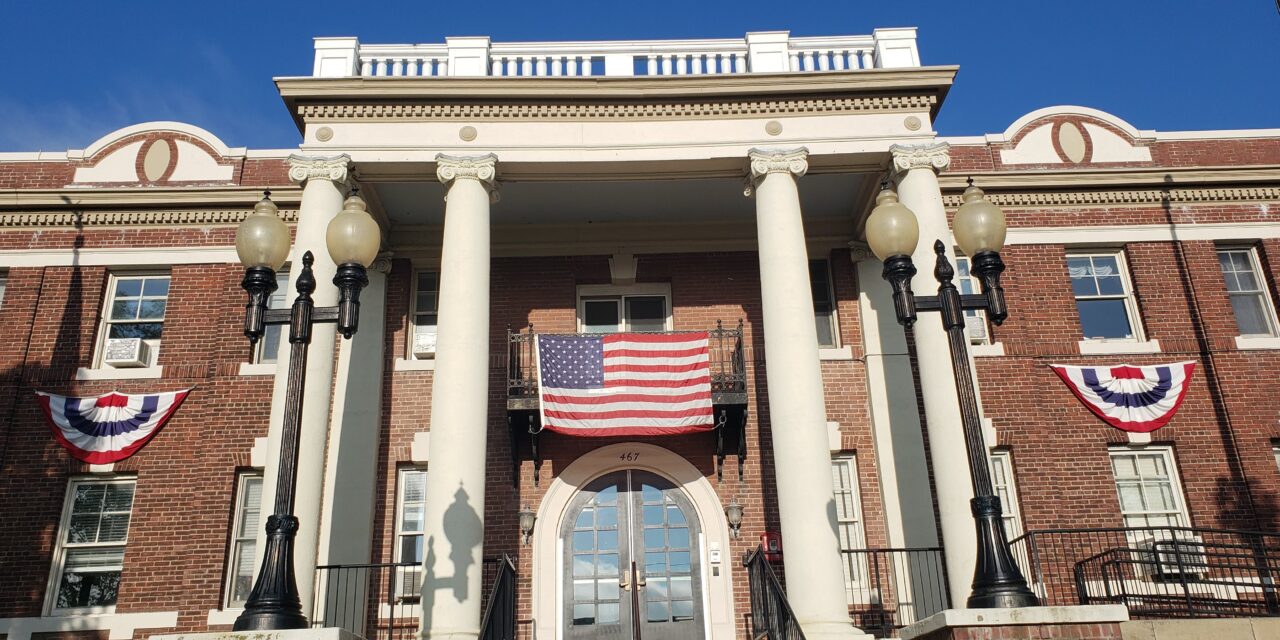By NEIL ZOLOT
WAKEFIELD – Residents rejected articles opposing a change in zoning to allow a marijuana dispensary at 12 Teal Road, during the second night of Town Meeting, Thursday, May 2 in the Galvin Middle School auditorium. Voters also voted down a proposed bylaw that would have addressed the flying of flags from town-owned poles.
Article 19 was to add provisions to the Zoning Bylaw for a dispensary in the form of an overlay district for the lot, while Article 20 removed language prohibiting marijuana sales in the General Bylaws. Article 19 required a two-thirds majority, 20 a simple majority. Town Counsel Tom Mullen explained they were taken in that order because if 19 passed, 20 would also, although there was a theoretical possibility 19 could fail based on dislike of that specific proposal, but 20 could still pass.
Speaking on behalf of lot owners, referred to only as “12 Teal Road LLC,” attorney Michael McCarthy spoke on the merits of the idea, including convenience for Wakefield residents, excise taxes and local impact taxes that would be paid to the town and the site’s isolation from neighborhoods and downtown in an industrial area off Audubon Road near Route 128,.
He also said the Article would not grant establishing a dispensary by right and would still require a Special Permit and licensing by the state.
“An overlay district will limit dispensaries in town,” he said. “This puts 12 Teal on an island. The overlay district will allow the town the experience of having a dispensary.”
Timothy Lilley of the Bylaw Review Committee called the site “the perfect place to put it. Other towns have these facilities and you don’t even notice them.”
Planning Board chairman Theodore Noell reported the Planning Board recommended passage.
Police Chief Steven Skory added colleagues in other communities reported few difficulties with dispensaries. “The overall response is there are no issues,” he said.
Board of Health vice-chairman Candace Linehan objected on the basis of there being no local guidelines for dispensaries. “We’re looking to consolidate policies to address issues,” she said.
Resident Julie Scott objected on the grounds the state Cannabis Control Commission “is a mess” and rife with political problems. “I’m not in favor of the CCC having anything to do with Wakefield and ask we not rush into granting it,” she said.
She also said local residents could be served by facilities in surrounding towns, including Lynn, Melrose and Saugus.
Resident Robert Mitchell countered dispensaries in neighboring communities might site their facilities very close to Wakefield to “lock up the area.”
Resident Christopher Bossi agreed, citing liquor stores being sited right next to dry towns to get business from their residents.
Mitchell also said the expense of marijuana makes it a product for middle class or affluent people. “People going into these places are not what you fear,” he said.
Resident Scot McCauley objected on the grounds the dispensary might be too close to a school with the accreditation of the school not being defined. He also said a facility would prohibit establishment of a new school near it.
The school in question is the School of Rock, which Moderator William Carroll characterized as a “business that calls itself a school.”
Mullen added siting the facility would not prohibit schools from being established near it after the fact.
The two-thirds requirement was not met, nor was a simple majority with 182 people voting against the Article and only 136 for it, after which McCarthy motioned for Article 20 to be postponed indefinitely.
Residents also rejected Article 21 proposing changes in bylaws about flying the national and state flags in town. Presented by Coolidge Park resident John Carney, it would have changed the General Bylaw to require flying the American Flag at each town facility that has one or more flagpoles. No other flag or banner may be displayed above the flag and no other than the POW-MIA flag be displayed below the American Flag.
“Wherever a second flagpole of equal height is present, the Massachusetts flag shall be the only flag flown except for the Four-Star Army general flag flown to honor General John Galvin at the Galvin Middle School and the Marine Corps flag to honor Colonel James Landrigan at Landrigan Field.”
Carney spoke about various veterans in his presentation, but others saw the idea as a plan designed to prohibit the flying of other flags, specifically the Juneteenth and LGBTQ+ Pride flags.
Noting Juneteenth is a legal holiday, veteran Robert Vincent said, “I fail to see why flying the flag of a federally recognized holiday is a problem. Wakefield is a welcoming place, but this serves the opposite purpose.”
“This is a hurtful thing and mean-spirited,” resident Elizabeth Lowry added. “As the parent of a trans kid, the Pride Flag means a lot to me. I’d like to think Wakefield is not mean-spirited.”
“The effect of this would be to prohibit the flying of these flags,” Town Council chairman Jonathan Chimes said. “We are a better town than this. We’re a town that welcomes inclusiveness. We’ve shown that by flying the Pride and Juneteenth flags.”
Middle School teacher Sue Langlois, who said she had been at Galvin since 7 a.m. reported her students “are flabbergasted by the way this country treats marginalized citizens.”
Resident Marcy McCauley said if other flags could be flown, why couldn’t a pro-life flag, which she had once requested, also be flown.
The Article was rejected in a vote by a show of hands.





